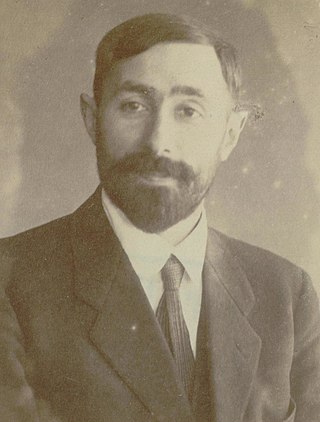In mathematics and computer science, currying is the technique of translating the evaluation of a function that takes multiple arguments into evaluating a sequence of functions, each with a single argument. For example, currying a function that takes three arguments creates a nested unary function , so that the code
In computer science, functional programming is a programming paradigm where programs are constructed by applying and composing functions. It is a declarative programming paradigm in which function definitions are trees of expressions that map values to other values, rather than a sequence of imperative statements which update the running state of the program.
In computer science, denotational semantics is an approach of formalizing the meanings of programming languages by constructing mathematical objects that describe the meanings of expressions from the languages. Other approaches providing formal semantics of programming languages include axiomatic semantics and operational semantics.
In software engineering and computer science, abstraction is:
In computer science, an abstract machine is a theoretical model that allows for a detailed and precise analysis of how a computer system functions. It is similar to a mathematical function in that it receives inputs and produces outputs based on predefined rules. Abstract machines vary from literal machines in that they are expected to perform correctly and independently of hardware. Abstract machines are "machines" because they allow step-by-step execution of programmes; they are "abstract" because they ignore many aspects of actual (hardware) machines. A typical abstract machine consists of a definition in terms of input, output, and the set of allowable operations used to turn the former into the latter. They can be used for purely theoretical reasons as well as models for real-world computer systems. In the theory of computation, abstract machines are often used in thought experiments regarding computability or to analyse the complexity of algorithms. This use of abstract machines is fundamental to the field of computational complexity theory, such as finite state machines, Mealy machines, push-down automata, and Turing machines.
In computing, partial evaluation is a technique for several different types of program optimization by specialization. The most straightforward application is to produce new programs that run faster than the originals while being guaranteed to behave in the same way.
Hypercomputation or super-Turing computation is a set of models of computation that can provide outputs that are not Turing-computable. Super-Turing computing, introduced in the early 1990s by Hava Siegelmann, refers to such neurological inspired, biological and physical realizable computing; It became the mathematical foundations of lifelong machine learning. Hypercomputation, introduced as a field of science in the late 1990s, is said to be based on the super-Turing, but it also includes constructs which are philosophical. For example, a machine that could solve the halting problem would be a hypercomputer; so too would one that can correctly evaluate every statement in Peano arithmetic.
In programming language theory and type theory, polymorphism is the provision of a single interface to entities of different types or the use of a single symbol to represent multiple different types. The concept is borrowed from a principle in biology where an organism or species can have many different forms or stages.
In computer science and software programming, a value is the representation of some entity that can be manipulated by a program. The members of a type are the values of that type.
In programming languages, ad hoc polymorphism is a kind of polymorphism in which polymorphic functions can be applied to arguments of different types, because a polymorphic function can denote a number of distinct and potentially heterogeneous implementations depending on the type of argument(s) to which it is applied. When applied to object-oriented or procedural concepts, it is also known as function overloading or operator overloading. The term ad hoc in this context is not intended to be pejorative; it refers simply to the fact that this type of polymorphism is not a fundamental feature of the type system. This is in contrast to parametric polymorphism, in which polymorphic functions are written without mention of any specific type, and can thus apply a single abstract implementation to any number of types in a transparent way. This classification was introduced by Christopher Strachey in 1967.
In computer science, a continuation is an abstract representation of the control state of a computer program. A continuation implements (reifies) the program control state, i.e. the continuation is a data structure that represents the computational process at a given point in the process's execution; the created data structure can be accessed by the programming language, instead of being hidden in the runtime environment. Continuations are useful for encoding other control mechanisms in programming languages such as exceptions, generators, coroutines, and so on.

Peter John Landin was a British computer scientist. He was one of the first to realise that the lambda calculus could be used to model a programming language, an insight that is essential to the development of both functional programming and denotational semantics.
In a given programming language design, a first-class citizen is an entity which supports all the operations generally available to other entities. These operations typically include being passed as an argument, returned from a function, and assigned to a variable.

Moses Ilyich Schönfinkel was a logician and mathematician, known for the invention of combinatory logic.

Christopher S. Strachey was a British computer scientist. He was one of the founders of denotational semantics, and a pioneer in programming language design and computer time-sharing. He has also been credited as possibly being the first developer of a video game. He was a member of the Strachey family, prominent in government, arts, administration, and academia.
In programming languages and type theory, parametric polymorphism allows a single piece of code to be given a "generic" type, using variables in place of actual types, and then instantiated with particular types as needed. Parametrically polymorphic functions and data types are sometimes called generic functions and generic datatypes, respectively, and they form the basis of generic programming.

Programming language theory (PLT) is a branch of computer science that deals with the design, implementation, analysis, characterization, and classification of formal languages known as programming languages. Programming language theory is closely related to other fields including mathematics, software engineering, and linguistics. There are a number of academic conferences and journals in the area.
In computing, a meta-circular evaluator (MCE) or meta-circular interpreter (MCI) is an interpreter which defines each feature of the interpreted language using a similar facility of the interpreter's host language. For example, interpreting a lambda application may be implemented using function application. Meta-circular evaluation is most prominent in the context of Lisp. A self-interpreter is a meta-circular interpreter where the interpreted language is nearly identical to the host language; the two terms are often used synonymously.

Carl Eddie Hewitt was an American computer scientist who designed the Planner programming language for automated planning and the actor model of concurrent computation, which have been influential in the development of logic, functional and object-oriented programming. Planner was the first programming language based on procedural plans invoked using pattern-directed invocation from assertions and goals. The actor model influenced the development of the Scheme programming language, the π-calculus, and served as an inspiration for several other programming languages.
In computer science, region-based memory management is a type of memory management in which each allocated object is assigned to a region. A region, also called a zone, arena, area, or memory context, is a collection of allocated objects that can be efficiently reallocated or deallocated all at once. Like stack allocation, regions facilitate allocation and deallocation of memory with low overhead; but they are more flexible, allowing objects to live longer than the stack frame in which they were allocated. In typical implementations, all objects in a region are allocated in a single contiguous range of memory addresses, similarly to how stack frames are typically allocated.




